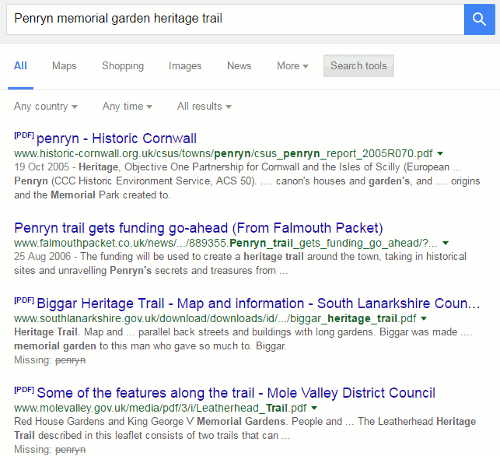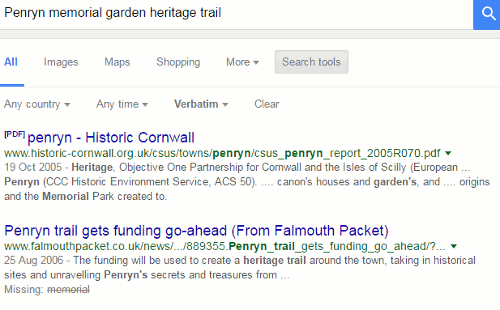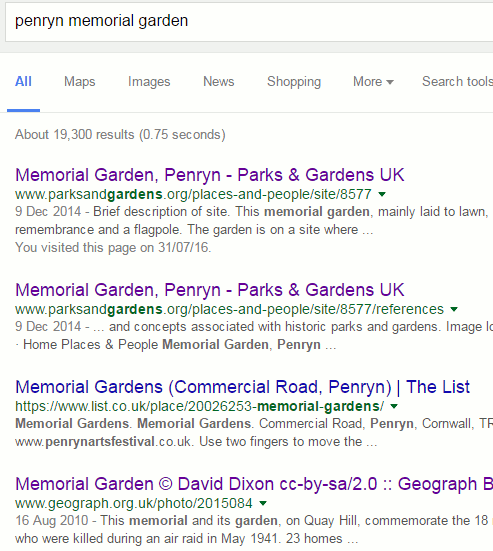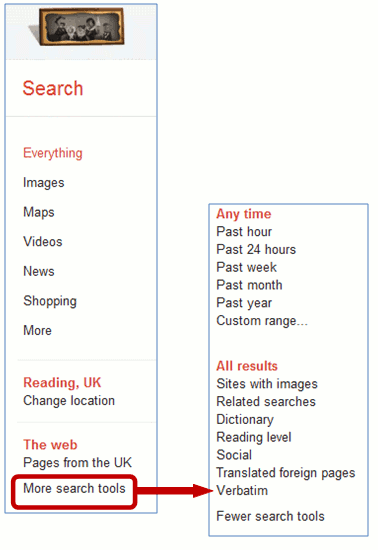Update: 1st September 2016 – Verbatim seems now to be working as it should. I hope it stays that way but on three occasions this year I have seen it work one day, then not the next and then back to working again.
We have become accustomed to Google rewriting and messing about with our searches, and dropping search features that are infrequently used. The one option that could control most of Google’s creative interpretation of our queries was Verbatim but that now looks as though it could be destined for the axe as well.
A reminder of what Verbatim does. If you want to stop Google looking for variations on your terms, ignoring double quote marks around phrases, or dropping words from the search Verbatim is, or rather was, the quickest way to do it. If you are using a desktop or a laptop computer, run your search as normal. On the results page click on ‘Search Tools’ at the end of the line of options that appears at the top. Then, from the second line of options that should appear, choose ‘All results’ followed by Verbatim. The location of Verbatim on other devices varies.
Verbatim has been invaluable when searching on titles of research papers, legislation or researching topics for which you expect or want to retrieve very few or zero results. You might be researching rare adverse events associated with a pharmaceutical drug or wanting to confirm that what you are about to patent has not already been published and is out there for all to see. Or the topic is so specific that you only expect to see a handful of documents, if that. So, sometimes, no or a low number of results is a good thing. But Google does not like zero or small numbers of results and that is when Google’s search rewrite goes into overdrive.
I had noticed for a few months that Verbatim was not always working as expected but had hoped it was one of Google’s experiments. The problem has not gone away and the really confusing part is that Verbatim is still doing something but not what I would expect.
I was working in Penryn in July and took the opportunity to wander around the place. Inevitably, I googled some of the sites I had seen for further information but one threw up the Verbatim problem. I was particularly interested in what looked like a memorial but didn’t have time to seek out information on site. Looking at the photo afterwards I can where the plaque was (to the right and next to the flagpole) but I missed it on the day.

I did see a sign on the wall surrounding the area, though, telling me that it was “two” on the Penryn Heritage Trail.
A quick, basic search told me that it is called the Memorial Garden but I wanted to find out more. I searched on Penryn memorial garden heritage trail.
This gave me 15,900 results but Google had decided to leave out Penryn so I was seeing plenty of information about heritage trails but they were not all in Penryn. I prefixed Penryn with intext: to force Google to include it in the search but then the word heritage was dropped. I applied Verbatim to the search without the intext: command.
This gave me 732 results but even though I had applied Verbatim Google had dropped ‘memorial’ from the search. I prefixed memorial with intext: and got 1230 results with little change to the top entries. And no, I have no idea why there are more hits for this more specific search. I can only assume that other terms were omitted but I was not seeing that in my top 50. I then did what I should have done right from the start and searched on Penryn, and “memorial garden” and “heritage trail” as phrases. When Verbatim was applied this came back with 22 results but no detailed information about the garden. I started to tweak the search terms a little more. Verbatim would drop one, I would ‘intext:’ them and they were then included but I began to suspect that I was being too specific. So I dropped “heritage trail” from the search and cleared Verbatim: 19,300 results with all of the top entries being relevant and informative.
This emphasises that it often pays to keep your search simple, and I mean really simple. Including too many terms, however relevant you may think they are, can be counter-productive. I would have realised earlier that my strategy was too complex had Verbatim behaved as I assumed it would and it had included all of my terms with no variations or omissions.
I ran a few of my test searches to see if this is now a regular feature. One was:
prevalence occupational asthma diagnosis agriculture UK
The results came back as follows:
Ordinary search – prevalence missing from some of the documents, 1,750,000 results
Verbatim search – diagnosis and agriculture missing from some of the documents, 15,300 results
Verbatim with quote marks around missing terms – same results as plain Verbatim with diagnosis and agriculture still missing
Verbatim search but prefixing missing terms with intext:, 14,200 results
I changed the search slightly to:
incidence occupational asthma diagnosis agriculture UK
Some of the results were:
Ordinary search – incidence and agriculture missing from some of the documents, 2,210,000 results
Verbatim search – incidence and agriculture missing, 15,500 results
Ordinary search on intext: incidence occupational asthma diagnosis intext:agriculture UK, 848,000 results
Verbatim intext:incidence occupational asthma diagnosis intext:agriculture UK, 15,000 results
I saw the same pattern with a few other searches. I also tested the searches in incognito mode, and both signed in and signed out of my Google account. There was very little difference in the results and Verbatim behaved in the same way.
It looks as though Verbatim still runs your search without any variations on your terms or synonyms but that it now sometimes chooses to omit terms from some of the documents. To keep those terms in the search you have to prefix them with intext:. Double quote marks around the words are sometimes ignored. This is an unnecessary change and defeats the object of having an option such as Verbatim.
More worrying, though, is that Google obviously thinks Verbatim needs “fixing”. But what it has done is to make the option more difficult to use, which in turn will result in people using it less often than they do already. And if Google sees that use is decreasing it will simply get rid of it altogether. Time to swot up on the few remaining Google commands, or use a different search tool.
If you are interested in learning more I am running workshops about Google and alternative search tools in September in London.




